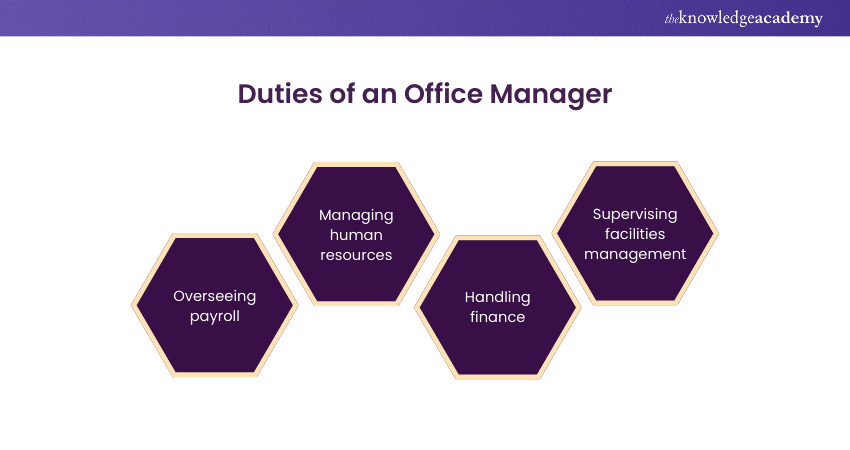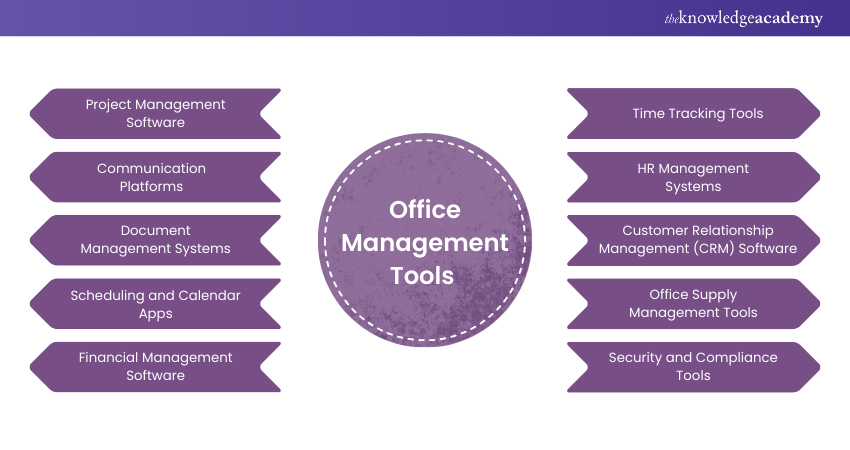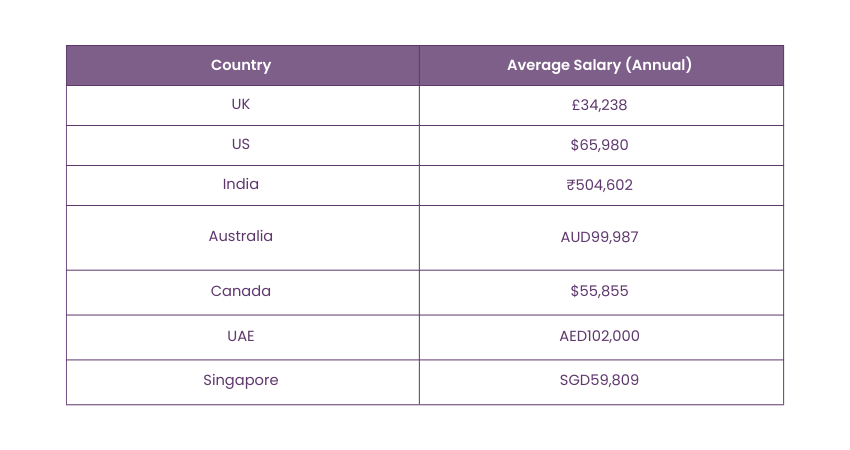We may not have the course you’re looking for. If you enquire or give us a call on +44 1344 203999 and speak to our training experts, we may still be able to help with your training requirements.
Training Outcomes Within Your Budget!
We ensure quality, budget-alignment, and timely delivery by our expert instructors.

Ever wondered who’s the secret sauce behind seamless office operations? Meet the Office Manager. But What is an Office Manager? Well, Office Manager is the person who orchestrates projects, juggles tasks, and keeps the office humming like a well-tuned symphony. Whether you aspire to be the office MVP or simply want to peek behind the curtain, our blog serves up a delightful exploration of this dynamic role. Come on in and unravel the magic woven by every successful office—the Office Manager!
Table of Contents
1) Who is an Office Manager?
2) Duties of an Office Manager
3) Key Skills for Office Managers
4) Benefits Office Managers Bring to an Organisation
5) Challenges Faced by Office Managers
6) Office Management Tools
7) Average Salary for Office Managers
8) Conclusion
Who is an Office Manager?
An Office Manager is someone who oversees the daily operations of an office. They organise administrative tasks, manage schedules, handle budgeting and resource allocation, and ensure a productive and efficient work environment.
Office Managers also support staff, resolve issues, maintain office supplies, and ensure adherence to regulations and safety standards.
Duties of an Office Manager
An Office Manager plays a pivotal role in the organisational ecosystem, orchestrating various functions to ensure the smooth operation of daily activities. Let's discuss some key responsibilities that define the multifaceted role of an Office Manager:

1) Overseeing Payroll
One fundamental responsibility of an Office Manager is the meticulous oversight of payroll processes. This involves managing employee compensation, ensuring accurate and timely disbursement of salaries, and compliance with tax regulations. Attention to detail is paramount to avoid discrepancies and ensure employees receive their earnings promptly. Additionally, the Office Manager collaborates with the finance department to maintain payroll records and address any payroll-related inquiries or concerns from staff members.
2) Managing Human Resources
Managing human resources is an important aspect of an Office Manager's role. This includes recruitment, onboarding, and personnel development. They work closely with HR departments to facilitate hiring, conduct employee orientations, and implement training programs. They also address employee relations, mediate conflicts, and ensure adherence to company policies. By fostering a positive work culture, Office Managers contribute to employee satisfaction and overall organisational success.
Keen on cracking the interview for Office manager, refer to our blog on Office Manager Interview Questions.
3) Handling Finance
Office Managers are entrusted with financial responsibilities, including budget management and financial reporting. They collaborate with executive leadership to develop budgets, monitor expenditures, and allocate resources efficiently. This involves a strategic approach to financial planning, cost analysis, and finding areas for potential savings.
They also liaise with accounting teams to reconcile financial records, track expenses, and prepare financial reports for review by stakeholders. Through effective financial management, they play a crucial role in sustaining the organisation's fiscal health.
4) Supervising Facilities Management
Facilities management is another key duty that falls within the purview of an Office Manager. This involves overseeing the physical work environment, ensuring it is conducive to productivity and meets the needs of employees. Office Managers coordinate maintenance activities, address safety concerns, and manage office supplies and equipment.
They collaborate with external vendors for facility services and negotiate contracts to optimise cost efficiency.
Key Skills for Office Managers
Now, let’s discuss some essential Office Manager Skills that every professional in this role should possess:
Hard Skills
a) Proficiency in Office Software: Office Managers need to know how to use software like Word, Excel, and PowerPoint. This helps them create documents, spreadsheets, and presentations efficiently.
b) Project Management: They should be able to plan and manage projects from start to finish. This includes setting goals, organising tasks, and keeping track of progress.
c) Budgeting and Financial Management: Office Managers must understand how to create and manage budgets. This helps them control spending and ensure financial stability.
d) Data Analysis and Reporting: They need to collect and analyse data to make informed decisions. This involves creating reports to show results and trends.
e) Human Resources Management: Office Managers often handle hiring, training, and employee relations. They ensure the team works well together and follows company policies.
Soft Skills
a) Strong Communication Skills: Office Managers must clearly share information with others. This includes writing emails, speaking in meetings, and listening to feedback.
b) Leadership and Team Management: They should guide and support their team members. This helps create a productive work environment.
c) Problem-solving Abilities: Office Managers need to quickly find solutions to issues that arise. This involves thinking creatively and staying calm under pressure.
d) Time Management: They must prioritise tasks and manage their time well. This ensures that projects are done on schedule.
e) Adaptability and Flexibility: Office Managers should be able to adjust to new situations and challenges. This helps them stay effective in a changing work environment.
Education Qualification
a) Bachelor’s Degree: A degree in Business Administration, Management, or a related field provides a strong foundation in business principles. It equips Office Managers with essential knowledge and skills.
b) Certification in Office Management: Earning a certification can enhance an Office Manager’s qualifications. It shows a commitment to the profession and can improve job prospects.
c) Continuous Professional Development: Office Managers should keep learning new skills and knowledge. Attending courses and workshops helps them stay updated with industry trends and best practices.
Benefits Office Managers Bring to an Organisation
Office Managers bring numerous benefits to an organisation, significantly enhancing its overall efficiency and productivity. They ensure daily operations run smoothly by organising tasks and streamlining processes, which saves time and increases productivity. By managing schedules and facilitating clear communication, they improve team coordination and ensure everyone is aligned with organisational goals.
Their problem-solving skills help quickly identify and resolve issues, preventing major disruptions. Efficient resource management, including equipment and budgets, helps reduce waste and control costs. They ensure adherence to regulations and safety standards, safeguarding the organisation from legal issues. Supporting senior management with administrative tasks and project coordination allows leaders to focus on strategic decisions.
Challenges Faced by Office Managers
Office Managers encounter various challenges that require strong skills and adaptability. Here are some of them:
a) Managing Diverse Teams: Office Managers often lead teams with varied backgrounds and skills. Balancing different personalities and work styles can be challenging.
b) Time Management: Handling multiple tasks and deadlines requires excellent time management skills. Prioritising effectively is crucial to keep everything running smoothly.
c) Budget Constraints: Managing budgets within limits while meeting office needs is a common challenge. Office Managers must find cost-effective solutions without compromising quality.
d) Maintaining Office Morale: Keeping employees motivated and satisfied can be difficult, especially during stressful times. Office Managers play a key role in fostering a positive and productive workplace.
e) Resource Allocation: Distributing resources like time, budget, and staff efficiently can be tricky. Office Managers need to ensure that all areas of the office are adequately supported.
f) Adapting to Change: Businesses constantly evolve, and Office Managers must adapt to changes in processes, policies, and personnel. Flexibility and resilience are vital in navigating these shifts.
g) Maintaining Confidentiality: Office Managers often handle sensitive information. Ensuring confidentiality and data security is critical to protect the organisation's interests.
Office Management Tools
Office Management tools streamline daily operations and enhance productivity in an office environment. Some of the tools are mentioned below:

a) Project Management Software: Tools like Asana, Trello, and Monday.com help Office Managers organise tasks, track progress, and manage team projects efficiently.
b) Communication Platforms: Slack, Microsoft Teams, and Zoom facilitate clear and effective communication within the team, allowing for seamless collaboration and virtual meetings.
c) Document Management Systems: Google Drive, Dropbox, and SharePoint provide secure storage, easy access, and sharing of important documents and files.
d) Scheduling and Calendar Apps: Outlook Calendar, Google Calendar, and Calendly help manage appointments, meetings, and deadlines, ensuring everyone stays on schedule.
e) Financial Management Software: QuickBooks, Xero, and FreshBooks assist in budgeting, invoicing, and tracking expenses, helping manage the office’s finances effectively.
f) Time Tracking Tools: Toggl, Clockify, and Harvest enable tracking of employee work hours, project time, and productivity metrics.
g) HR Management Systems: BambooHR, Gusto, and Workday streamline employee onboarding, payroll, and performance management processes.
h) Customer Relationship Management (CRM) Software: Salesforce, HubSpot, and Zoho CRM help manage client interactions, sales processes, and customer data.
i) Office Supply Management Tools: Office inventory software like Officewise and Precoro assist in tracking and managing office supplies and equipment.
j) Security and Compliance Tools: Tools like Norton, McAfee, and GDPR compliance software ensure data security and adherence to legal standards.
Average Salary for Office Managers
Below is a table showing the average salaries of Office Managers in the specified countries:

Source: Glassdoor
Note: Please remember that these figures depend on factors such as experience, location, and company size.
Conclusion
We hope that you understood What is an Office Manager. If you plan to become an Office Manager, follow this blog thoroughly. Always remember that becoming an Office Manager means being assigned some of the most critical organisational tasks. Effective communication, liaison between different departments, and quick-thinking ability will help you solve even the most complex problems.
Frequently Asked Questions

A visitor tracking system enhances security by monitoring and controlling access to the premises. It provides accurate real-time data on visitor traffic, improves regulatory compliance, and ensures a safe environment. Additionally, it streamlines the check-in process, enhances the visitor experience, and contributes to overall facility management efficiency.

Billing software automates financial processes, from invoicing to payment tracking. It reduces manual errors, accelerates billing cycles, and ensures accurate financial transactions. The software also offers expense tracking and financial reporting features, providing Office Managers with greater visibility into financial operations.

The Knowledge Academy takes global learning to new heights, offering over 30,000 online courses across 490+ locations in 220 countries. This expansive reach ensures accessibility and convenience for learners worldwide.
Alongside our diverse Online Course Catalogue, encompassing 17 major categories, we go the extra mile by providing a plethora of free educational Online Resources like News updates, Blogs, videos, webinars, and interview questions. Tailoring learning experiences further, professionals can maximise value with customisable Course Bundles of TKA.

The Knowledge Academy’s Knowledge Pass, a prepaid voucher, adds another layer of flexibility, allowing course bookings over a 12-month period. Join us on a journey where education knows no bounds.

The Knowledge Academy offers various PA and Secretarial Course, including the Office Management Course, Administrative Assistant Training, and Secretarial Course. These courses cater to different skill levels, providing comprehensive insights into Office Manager Skills.
Our Business Skills Blogs cover a range of topics related to Office Management, offering valuable resources, best practices, and industry insights. Whether you are a beginner or looking to advance your Office Management skills, The Knowledge Academy's diverse courses and informative blogs have got you covered.
Upcoming Business Skills Resources Batches & Dates
Date
 Company Secretary Training Course
Company Secretary Training Course
Fri 24th Jan 2025
Fri 21st Mar 2025
Fri 2nd May 2025
Fri 27th Jun 2025
Fri 29th Aug 2025
Fri 3rd Oct 2025
Fri 5th Dec 2025







 Top Rated Course
Top Rated Course



 If you wish to make any changes to your course, please
If you wish to make any changes to your course, please


